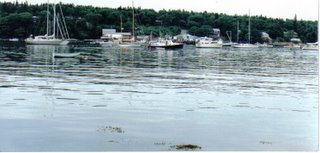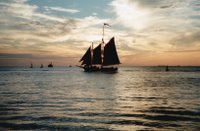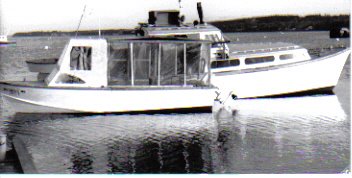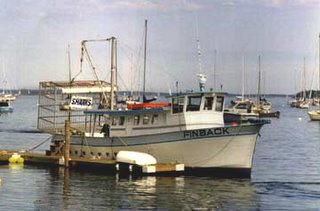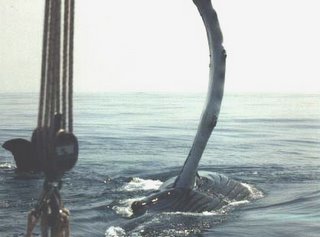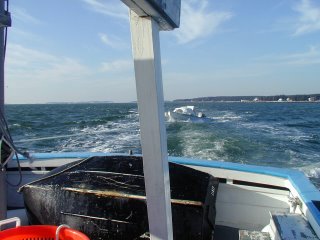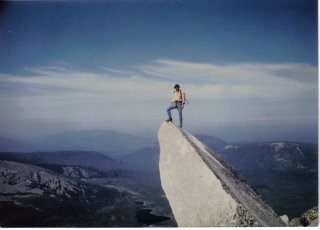
(another article by Bob Bernstein originally published in
Offshore magazine in one form or another)
Ever see a pooch on the foredeck of a skiff, nose pointed forward, ears flapping back against his head, his owner at the helm steering for some distant locale? Ever watch a dog trying to communicate with a mackerel flopping around inside a five-gallon bucket? Yep. There's no doubting it: Dogs love the boating life.
Mine does, anyway. Put her on a boat, any boat, and she'll make Sir Francis Chichester look like the King of the Dirt Farmers. Go ahead. Pooh-pooh a dog's brain for being mostly tuned to the business of sniffing, i.e. figuring out the subtle differences between a squashed jackrabbit on I-95 and a half-cooked herring belly lying on the lazarette hatch in the noonday sun. Scoff all you want. There's more to those aromatically challenged doggie synapses than you think. Deep within their fist-sized masses of gray matter lies enough cognitive ability to understand what 90% of pleasure boating is all about. That's right, I'm talking about a dog's two favorite things in the whole world: Eating and Sleeping.
My dog, Bullitt, named for the movie of the same name starring Steve McQueen -- if you saw me chasing after Bullitt when she was a puppy you'd understand why -- is a virtual sleeping and eating machine. I used to run bird and whale watch trips, and during the eight hour steam out and back, she was in canine heaven. She'd sleep from 7:00 am to around 11:00 am, then arise like a Phoenix out of the ashes when the distinctive wrinkling of a sandwich wrapper would roust her from her reverie. (It's a miracle of nature and a proven fact, tested I believe on the Bonneville Salt Flats, that a dog can hear a person opening a can of Vienna Sausages from five miles away.)
Listening to people eat is one thing, joining in is another. Everyone knows, a daily diet of human food is no good for a dog, and I honestly tried to keep the Bullie dog on the straight and narrow. But no matter how much I insisted over the PA for my passengers not to feed the dog (Attention on deck! Please come to the wheelhouse and pick up doggie biscuits if you want to feed Bullitt.), people just couldn't resist. There was this one time I came out the port side door of the cabin, turned aft, and found her standing over a 12 inch Italian Hoagie. Didn't that get my goat. Not only was she eating the wrong kind of food, she was eating better than I was.
However, life aboard the boat wasn't all subways and siestas for good old Woolly Bullie. A few years ago, I had a group of whale watchers southeast of Seal Island National Wildlife Refuge. We were busy eyeing a pod of four finback whales when a fifth whale showed up. This fifth animal was a sei whale, and it was much more active and curious about the boat and the people on it than were any of the more standoffish finbacks. The sei would charge, then, five feet from the hull, dive straight down. Ten seconds later it would surface on the other side. It continued this form of play for 30 minutes or more. And every time it surfaced, it would let out a massive breath of fishy-smelling spray.
We were all running around the deck, following the whale. We'd watch it charge the boat, then see it dive headfirst into the depths. Visibility was more than 50 feet, and we could see nearly the whole length of the whale as it turned gracefully downward and disappeared with one or two massive swipes of its tail fin. Quite the spectacle, except for one thing. . . .
The dog found the whale -- how should I say it? -- irritating. Every time the whale surfaced and blew, Bullitt would run willy-nilly around the deck whining and howling like a Scotch banshee. All I could think of was to pick her up in my arms and show her what the commotion was all about. In retrospect, my effort compared similarly to putting out a small grass fire with a pail full of gasoline. Instead of howling and running around on deck, the dog dug her claws into my shoulders and howled INTO MY EAR! Now this is something I'm more than a little used to given that I spend a good deal of time doing the exact same thing during thunderstorms, fireworks celebrations, and those unfortunate times when duck hunters venture too close to my house on Watts Cove. But I think the whole affair probably looked to my passengers like some form of sadomasochistic torture.
There was one other whale encounter Bullitt took exception to and it happened during a beautiful, flat calm day in July. We were cruising southeast through Maine's Penobscot Bay. I had a group of editorial and production staff from a national magazine aboard. when we spotted what looked like the inner tube from one of the space shuttle's wheels floating on the surface. We closed the distance, and the situation became clear and somewhat desperate. It was a minke whale, and it had gotten itself tangled in lobster gear, so much so that it was anchored to the bottom by twenty to thirty pairs of traps. The tide was flooding, and the animal was already tired from struggling to stay afloat. It also had a helluva sunburn.
To make a
long story short, I maneuvered close. Then, with a sharp knife in my hand and the whale's tail hauled nearly to the boat's rail, the men aboard hung me over the side by my feet, and I cut the animal loose. I'd like to say it winked or nodded in appreciation but all it did was swim off and dive, then give us a nice big blow about 30 minutes later. Minke whales don't ordinarily have a visible spout, so maybe this was its way of saying, Thanks. Anyway, during the whole incident, Bullitt never veered more than three inches away from my right foot, except when I was being hung over the side, at which time she ran around deck and howled and whined like a Scotch banshee.
Just so you understand, Bullitt doesn't act this way with all whales. Of the dozens upon dozens of whale encounters we've had aboard the boat over the years, these were the only two that elicited such a response. Maybe she was scared. Or maybe, as I like to think, she was just trying to relay some form of whale communication to us less empathetic humans.
Pets are like that. They can communicate with other members of the animal kingdom in ways us humans will never understand. For example, we had a transient chocolate lab at that marina that liked to run up and down the docks barking at the seagulls, not the ones on the dock, mind you, but the ones flying overhead. Was he challenging them? Warning them? Or was he trying to tell us something? Your guess is as good as mine.
Another lab I knew, a yellow one named, Nell, liked to commune with the fishes at the most inopportune times. Billy Soltz, my best friend from high school, and his family, had a 17' Boston Whaler Montauk that we'd run back and forth between Bayport and Fire Island on Great South Bay. Once, when we were cruising along at about 30 knots, the Soltz's dog, Nell, just up and jumped overboard. We turned around and found her happy as a clam swimming in circles in the middle of the bay. After that we knew well enough to keep a watchful eye on her as well as a tight grip on her collar. But at speeds over 15 knots, her beady little eyes were always peeled to the wake, and her whole body shook with the urge to plunge into the sea.
Chasing birds, diving into the ocean, receiving psychic messages from whales, and dreaming of deck loads of hoagies, add up to tons of boating excitement for dogs. And even if they don't get the chance to do something wonderful like take a quick slurp out of the bloody chum bucket when you're not looking, there's no doubt they'd rather be by your side on the boat than anywhere else on the planet.
A Note About Pet Safety Aboard the BoatFirst thing you want to do is get a good pfd for the pet. This is especially true for people with flush deck boats, and, particularly, for people with sailboats. Also, if you have a boat like this, it's not a bad idea to consider safety netting. My boat, Finback, has a 40" bulwark, so there's virtually no chance for my dog to jump overboard. However, as Billy Soltz and Nell can attest [see story], sometimes the urge to make a splash can be overwhelming. For example, when I get close to the dock, I always assign someone the job of holding onto the dog, because I don't want her vaulting for the dock prematurely.
In addition, at night and in rough weather, it's a good idea to clip a safety light to the dog's pfd. Keep it turned on during the passage and it will insure that if the dog has an unfortunate accident and falls overboard, you'll have the best chance of finding it.
Also make sure your pet has plenty of water. Dogs get dehydrated just like people, and they get seasick, too, which further dehydrates them. There's not much you can do for a seasick dog, except give it someplace comfortable to sleep where it won't slide around or get hurt by things flying off of shelves and out of cabinets. Usually a dog will seek out it's own place. If it does, make it comfortable and safe there. Eventually, seasickness will pass, and many dogs that get seasick in the beginning, adjust accordingly and stop getting seasick altogether.
Dr. Glenn Yovino, at the Harbor Road Veterinary Hospital in South Thomaston, Maine, has a few more suggestions:
1. Make sure the animal's pfds are appropriately sized. This is key.
2. Acclimating the animal to the boat before embarking on a long trip. Let them get familiar with the boat, the dock, the skiff, and short trips.
3. If you're going out of the country, do your homework. First, you need to make sure it's allowed. Second, if it is allowed, you have to get the paperwork in order.
4. Seasickness can be an issue. Some people think the dog should be sedated, but Dr. Yovino says dogs do best with their wits about them. Again, acclimate the dog to short trips first. And, if you're expecting heavy seas, Yovino suggests skipping a meal.
5. Don't forget to always have plenty of fresh water available.
6. Most dogs can go twelve hours without urinating, but Yovino suggests trying to get the dog to urinate every four hours. Remember that a house-trained dog needs to be retrained to go on a boat. They need to be praised for doing what they think is the wrong thing. If you're not going to stop every four hours and walk them on land, try and get them to go on deck. And, if you suspect they're holding it in, put the leash on and give them a walk around deck just like you would do on land. Put some paper down and see if that'll work. When they finally go, make sure you praise them. And don't worry, they'll know the difference between the deck and your living room.
7. Last but not least, Yovino cautions boaters to be very careful with young animals. Don't subject puppies and/or kittens to long trips or rough weather.
-seabgb
Copyright © Bob G. Bernstein (seabgb) All Rights Reserved
 Me and My Dad in South Thomaston, My Old Boat in the Background, Eben Island and the Muscle Ridge Islands in the Distance
Me and My Dad in South Thomaston, My Old Boat in the Background, Eben Island and the Muscle Ridge Islands in the Distance